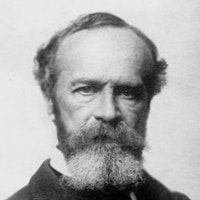When we survey the whole field of religion… the feelings on the one hand and the conduct on the other are almost always the same, for Stoic, Christian, and Buddhist saints are practically indistinguishable.
When we survey the whole field of religion… the feelings on the one hand and the conduct on the other are almost always the same, for Stoic, Christian, and Buddhist saints are practically indistinguishable.
William James

Almost Always the Same
Theme: Interfaith Dialogue
When we survey the whole field of religion, we find a great variety in the thoughts that have prevailed there; but the feelings on the one hand and the conduct on the other are almost always the same, for Stoic, Christian, and Buddhist saints are practically indistinguishable.
William James was born on January 11, 1842, in New York City, into a wealthy and intellectually stimulating family. He was the eldest of five children, including his brother Henry James, who would become a renowned novelist. William's father, Henry James Sr., was a Swedenborgian theologian whose unconventional ideas greatly influenced his children. The family traveled extensively in Europe during William's youth, exposing him to diverse cultures and educational systems. James initially pursued painting but eventually turned to science, enrolling at Harvard Medical School in 1864. He earned his M.D. in 1869 but never practiced medicine, instead focusing on psychology and philosophy. James married Alice Gibbens in 1878, and they had five children together. He died on August 26, 1910, at his summer home in Chocorua, New Hampshire.
James's psychological research and writings were groundbreaking and influential. He is often referred to as the "Father of American Psychology" for his pioneering work in the field. In 1890, he published his seminal work, "The Principles of Psychology," which became a foundational text in the discipline. James introduced several key concepts, including the stream of consciousness, the James-Lange theory of emotion, and the idea of habit formation. He was also one of the first to explore the subconscious mind and its influence on behavior. James's approach to psychology was marked by its emphasis on individual experience and the practical applications of psychological insights. He was a proponent of pragmatism in philosophy and functionalism in psychology, both of which focused on the practical consequences of ideas and mental processes.
Throughout his life, James maintained a deep interest in spirituality and wisdom traditions, which significantly influenced his philosophical and psychological work. His exploration of these topics is most evident in "The Varieties of Religious Experience" (1902), based on his Gifford Lectures. In this work, James examined the nature of religious and mystical experiences from a psychological perspective, arguing for their validity and importance in human life. He was particularly interested in the practical effects of religious belief on individuals and society. James's approach to spirituality was notably open-minded and pluralistic; he sought to understand diverse religious experiences without reducing them to mere psychological phenomena. His work in this area continues to be influential in the fields of religious studies, psychology of religion, and philosophy of religion, bridging the gap between scientific inquiry and spiritual exploration.
The Varieties of Religious Experience
James, William. The Varieties of Religious Experience: A Study of Human Nature. London: Penguin Books, 1902.

William James
Theme: Interfaith Dialogue

About This William James Quotation [Commentary]
William James, in “The Varieties of Religious Experience,” explores the common ground across different religious traditions. He observes that while doctrines and practices may vary widely, the emotional experiences and ethical conduct of saints—whether Stoic, Christian, or Buddhist—are strikingly similar. James suggests that despite the differences in belief systems, those who reach the highest levels of spiritual attainment often share a deep emotional resonance and ethical commitment. This insight invites reflection on the shared human capacity for profound spiritual experience, transcending specific religious boundaries.
James emphasizes a pragmatic approach to religion, focusing on the shared experiences and behaviors that unite rather than the doctrinal differences that divide. He notes that the saints of diverse traditions, despite their different theological foundations, exhibit similar compassion, self-discipline, and devotion. This perspective shifts the focus from what one believes to how those beliefs shape one’s life and character, highlighting the importance of lived religious experience.
In the context of interfaith dialogue, James’ observation that saints from varied traditions are “practically indistinguishable” in their feelings and conduct suggests that meaningful connections can be made across religious boundaries. By focusing on shared human experiences rather than theological differences, James’ insights offer a valuable framework for fostering understanding and harmony among different faiths.
More About This William James Quotation [Commentary]
This quotation comes from William James’ influential work “The Varieties of Religious Experience,” first published in 1902. This book is based on James’ Gifford Lectures on natural theology delivered at the University of Edinburgh in 1901-1902.
A respected source that provides context and commentary for this quotation is “William James and the Varieties of Religious Experience: A Centenary Celebration” edited by Jeremy Carrette, published by Routledge in 2004. This book offers a collection of essays by scholars analyzing James’ work on its 100th anniversary.
In this book, scholar David Lamberth provides commentary on James’ approach to religious diversity. He notes that James was arguing for a kind of religious pluralism, suggesting that while religious beliefs and doctrines may differ widely, the core emotional experiences and ethical behaviors of deeply religious individuals tend to be quite similar across traditions.
Lamberth explains that James was proposing a pragmatic approach to understanding religion, focusing on its practical effects in people’s lives rather than on theological debates. By highlighting the similarities in feelings and conduct among saints of different traditions, James was suggesting that the essence of religion might be found in these shared experiential and behavioral aspects rather than in specific belief systems.
This perspective was quite innovative for its time and continues to be influential in religious studies and philosophy of religion. James’ approach opened up new ways of thinking about religious diversity and the common ground that might exist between different faith traditions.
Additional William James Quotes
“Out of my experience, such as it is (and it is limited enough) one fixed conclusion dogmatically emerges, and that is this, that we with our lives are like islands in the sea, or like trees in the forest. The maple and the pine may whisper to each other with their leaves. … But the trees also commingle their roots in the darkness underground, and the islands also hang together through the ocean’s bottom*. Just so there is a continuum of cosmic consciousness, against which our individuality builds but accidental fences, and into which our several minds plunge as into a mother-sea or reservoir.”
—William James [“Confidences of a ‘Psychical Researcher'”, in The American Magazine, Vol. 68 (1909)] p. 589.
* [Often misquoted as: “We are like islands in the sea, separate on the surface but connected in the deep.”]
“The perfect stillness of the night was thrilled by a more solemn silence. The darkness held a presence that was all the more felt because it was not seen. I could not any more have doubted that HE was there than that I was. Indeed, I felt myself to be, if possible, the less real of the two.”
—William James [The Varieties of Religious Experience].
“Were one asked to characterize the life of religion in the broadest and most general terms possible, one might say that it consists of the belief that there is an unseen order, and our supreme good lies in harmoniously adjusting ourselves thereto.”
—William James [The Varieties of Religious Experience].
“Through prayer, religion insists, things which cannot be realized in any other manner come about: energy which but for prayer would be bound is by prayer set free and operates in some part, be it objective or subjective, of the world of facts.”
—William James [The Varieties of Religious Experience].
Resources
Related Quotes
Copyright © 2017 – 2026 LuminaryQuotes.com About Us